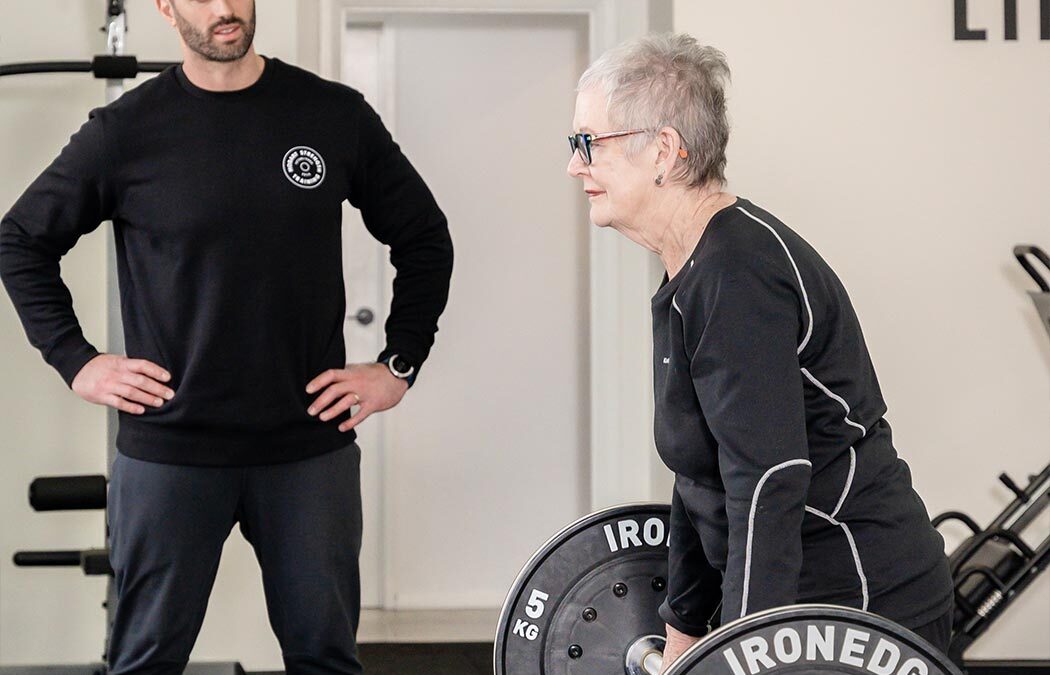Getting strong is a lifelong pursuit. It starts with regular progressive resistance training, also known as Strength Training. Adding consistent physical activity and health-promoting dietary patterns builds a solid framework for longevity. At Hobart Strength Training, we help you get Stronger For Life. As the holiday season approaches, many of us reflect on what matters most—rich social connections, hobbies and activities that bring joy, and the physical ability to stay independent. With that in mind, today we’ll discuss how getting strong enhances community, purpose, and independence.
Strong community connections
Community is critical to health. Research, such as this Meta-Analysis from 2015, has shown that “social isolation on risk for mortality is comparable with well-established risk factors for mortality.” However, access to communities often depends on physical capacity. Strength plays a key role in fully engaging in social activities. For example, hobbies like football, golf, or martial arts require strength. Family activities, such as picking up grandchildren or playing backyard cricket, also rely on physical strength. These interactions contribute to a sense of connection and belonging, essential for well-being. Building strength helps you stay active in the activities that matter most, fostering deeper relationships. Strength isn’t just about fitness—it’s about enabling meaningful connections and enriching your life.
Strength with purpose
Without getting too existential, many things provide purpose. Hobbies like gardening, for example, connect us to nature and community. Simple routines—like morning walks to your favorite café for a brew and a chat—offer grounding and joy. However, activities that give meaning often rely on physical abilities. Tasks like squatting to plant, reaching to prune, or pulling weeds require strength. Losing these capabilities can impact not just physical health but also a sense of purpose.
A recent scoping review on retired athletes revealed similar challenges. It found that losing their athletic identity often led to depression, social isolation, and health risks. These athletes benefited from structured programs that helped them redefine their identity and embrace new routines. Everyday people can face similar struggles when physical limitations force them to abandon beloved activities. By maintaining strength and staying active, you can preserve your ability to enjoy life’s meaningful pursuits.
Independent and strong
Physical independence as we age is a key component of maintaining a high quality of life. Unfortunately, many of us know loved ones who face physical limitations as they grow older, leaving them unable to participate in communities, pursue hobbies, or even perform activities of daily living (ADLs). These tasks include essentials like shopping, cooking, climbing stairs, and dressing—functions that maintain our dignity and identity. If nothing else motivates you to maintain strength, consider how essential physical independence is for enjoying life on your own terms.
Research supports this, with a 2024 study from BMC Geriatrics emphasizing the importance of functional fitness (FF) in maintaining independence. Functional fitness refers to the physical capacity to perform daily activities safely and independently without excessive fatigue. The study identifies key components—like muscle strength, cardiovascular endurance, and balance—as predictors of whether older adults can live independently. Alarmingly, physical fitness can decline by nearly 29% over 20 years, starting as early as age 60, with muscle strength deteriorating even faster after age 70.
Give yourself the gift of strength this Christmas
Wherever you are in life, it’s never too late to start getting stronger. Community, purpose and independence are three reasons to start getting stronger this holiday season. You might feel like you’re at the foot of the mountain and aren’t sure where to start but at Hobart Strength Training, we’ve got the map, the tools and the guides to put you on the right path. No matter where you are right now, as the study from BMC Geriatrics shows, building strength, endurance and balance equips adults to maintain independence and enjoy a high quality of life, even into their 80s and beyond. If you’re ready to take the first step, contact us today.
References:
- The association between social relationships and depression: a systematic review – PubMed
- Adaptation to life after sport for retired athletes: A scoping review of existing reviews and programs | PLOS ONE
- Functional fitness and physical independence in later years: cut-off values and validation | BMC Geriatrics | Full Text

